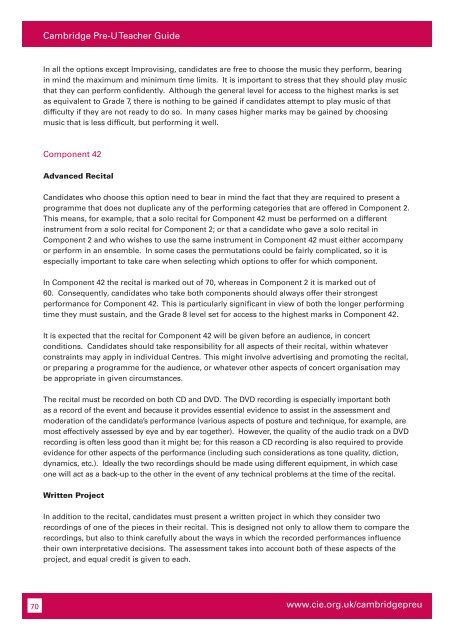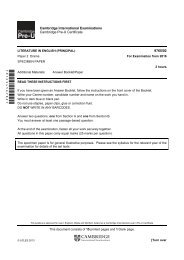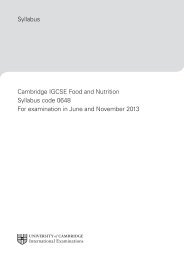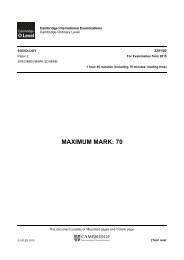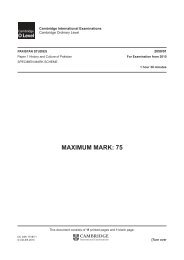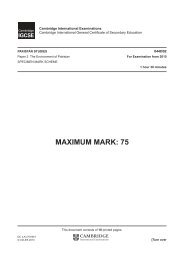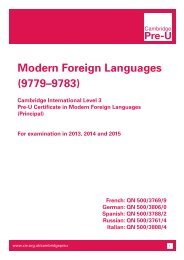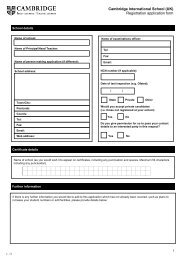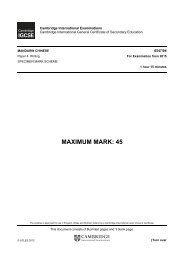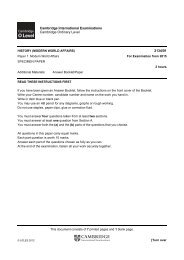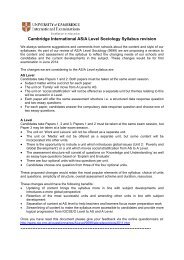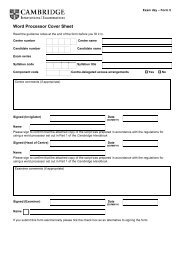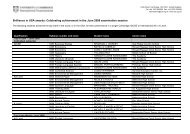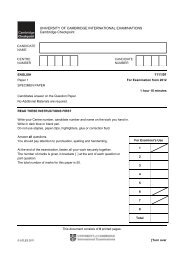Teacher's Guide Cambridge Pre-U MUSIC Available for teaching ...
Teacher's Guide Cambridge Pre-U MUSIC Available for teaching ...
Teacher's Guide Cambridge Pre-U MUSIC Available for teaching ...
Create successful ePaper yourself
Turn your PDF publications into a flip-book with our unique Google optimized e-Paper software.
70<br />
<strong>Cambridge</strong> <strong>Pre</strong>-U Teacher <strong>Guide</strong><br />
In all the options except Improvising, candidates are free to choose the music they per<strong>for</strong>m, bearing<br />
in mind the maximum and minimum time limits. It is important to stress that they should play music<br />
that they can per<strong>for</strong>m confidently. Although the general level <strong>for</strong> access to the highest marks is set<br />
as equivalent to Grade 7, there is nothing to be gained if candidates attempt to play music of that<br />
difficulty if they are not ready to do so. In many cases higher marks may be gained by choosing<br />
music that is less difficult, but per<strong>for</strong>ming it well.<br />
Component 42<br />
Advanced Recital<br />
Candidates who choose this option need to bear in mind the fact that they are required to present a<br />
programme that does not duplicate any of the per<strong>for</strong>ming categories that are offered in Component 2.<br />
This means, <strong>for</strong> example, that a solo recital <strong>for</strong> Component 42 must be per<strong>for</strong>med on a different<br />
instrument from a solo recital <strong>for</strong> Component 2; or that a candidate who gave a solo recital in<br />
Component 2 and who wishes to use the same instrument in Component 42 must either accompany<br />
or per<strong>for</strong>m in an ensemble. In some cases the permutations could be fairly complicated, so it is<br />
especially important to take care when selecting which options to offer <strong>for</strong> which component.<br />
In Component 42 the recital is marked out of 70, whereas in Component 2 it is marked out of<br />
60. Consequently, candidates who take both components should always offer their strongest<br />
per<strong>for</strong>mance <strong>for</strong> Component 42. This is particularly significant in view of both the longer per<strong>for</strong>ming<br />
time they must sustain, and the Grade 8 level set <strong>for</strong> access to the highest marks in Component 42.<br />
It is expected that the recital <strong>for</strong> Component 42 will be given be<strong>for</strong>e an audience, in concert<br />
conditions. Candidates should take responsibility <strong>for</strong> all aspects of their recital, within whatever<br />
constraints may apply in individual Centres. This might involve advertising and promoting the recital,<br />
or preparing a programme <strong>for</strong> the audience, or whatever other aspects of concert organisation may<br />
be appropriate in given circumstances.<br />
The recital must be recorded on both CD and DVD. The DVD recording is especially important both<br />
as a record of the event and because it provides essential evidence to assist in the assessment and<br />
moderation of the candidate’s per<strong>for</strong>mance (various aspects of posture and technique, <strong>for</strong> example, are<br />
most effectively assessed by eye and by ear together). However, the quality of the audio track on a DVD<br />
recording is often less good than it might be; <strong>for</strong> this reason a CD recording is also required to provide<br />
evidence <strong>for</strong> other aspects of the per<strong>for</strong>mance (including such considerations as tone quality, diction,<br />
dynamics, etc.). Ideally the two recordings should be made using different equipment, in which case<br />
one will act as a back-up to the other in the event of any technical problems at the time of the recital.<br />
Written Project<br />
In addition to the recital, candidates must present a written project in which they consider two<br />
recordings of one of the pieces in their recital. This is designed not only to allow them to compare the<br />
recordings, but also to think carefully about the ways in which the recorded per<strong>for</strong>mances influence<br />
their own interpretative decisions. The assessment takes into account both of these aspects of the<br />
project, and equal credit is given to each.<br />
www.cie.org.uk/cambridgepreu


